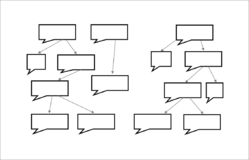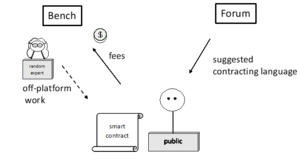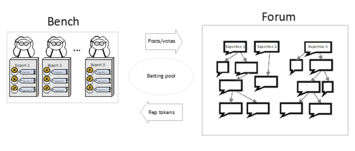Forum
A Forum in DGF is a database that holds the history of a DAO. It is the open repository of every official action a DAO takes. Thus, the Forum contains every official comment any DAO member has ever made, every governance proposal, the history of the development of every smart contract used, and the history of each member's work for the public. By definition a DAO action is official if it has been subjected to a Validation Pool, so the Forum also holds the record of every vote the DAO has ever made, as well as the history of every REP token minted and distributed for any reason. The Forum, along with the Validation Pool smart contract (VPSC), form the core of the back-end of DGF. The Forum is a therefore a basic component of DGF flow.
There are many different Forums. In fact, each DAO may have many Forums, one for each of the different types of REP it uses.
Overview[edit | edit source]
Review of REP[edit | edit source]
The Forum is a growing database, holding the set of all posts with references. Each post is validated and has a variable reputational value, depending on how important the contribution is to the DAO. All the REP token holdings in the DAO can be read from the Forum. The references from one post to another shares REP value if it is a positive reference, or leaches REP value if the reference is negative. Thus, the Forum allows a DAO to change the REP holdings of older accounts (posts) by making new posts with new references.
In other words, the Forum's reference structure allows a DAO to revise its history. Under DGF a DAO can correct past mistakes by either donating new REP to a deserving member, or slashing REP from a Byzantine member who violated a principle in the past while avoiding the automated protocols. In this way, DGF solves the dilemma of punishing those who game the system, while still respecting the Web3 principle of "code is law".
The ability to revise its history is what gives the DAO the power of judicial governance. This ability of the system to observe itself and adjust its past gives it the ability to evolve structurally. Parameters in the DAO's smart contracts can be tuned in response to the changing market, through legislative governance. Legislative governance can change the smart contracts themselves by posting new proposals in the Forum. The REP-weighted Forum posts, which have foundational meaning through the REP salary, gives the DAO the incentive structure to continually improve.
Engaging the public[edit | edit source]
Using the public UI, a customer can engage a member of the DAO to do work by encumbering the required fee in the official work smart contract (WSC). The Forum is the place the public UI search engine finds the current WSC, as well as the human-readable language which the DAO publishes to advertise their value to the non-expert, along with the user-friendly public UI itself. This describes the types of work the DAO has previously agreed it is willing to do, along with the protocols for doing that work which are automatically reviewed under executive governance through the Validation Pool.
Transparent auditing[edit | edit source]
The Forum is also the environment where the public can audit the effectiveness of the DAO, since the transparent nature of a primary DAO naturally encourages maximal information on the history of member performance and customer satisfaction.
The Forum holds the history of every governmental action the DAO has performed, including debates on protocol development and value statements and explicit goals the DAO has agreed on. This transparency allows the public to audit the DAO's history of REP evolution and governance parameters so that they can measure the DAO's performance against its advertised values, in order to objectively to gauge the DAO's integrity before using it. (See Main article: Reputation tokenomics.) The Forum therefore solves the business problem of building history and integrity in a DAO filled with pseudonymous international members.
Member interaction[edit | edit source]
For members, the Forum has many functions. Most importantly, the Forum is where their WSC stores evidence of their successful completion of work. This evidence is the basis for peer validation through the VPSC. It therefore holds the record of the creation of each REP token, which determines the member's power in the DAO.
Secondly, the Forum holds the most current protocols for successful collaboration with the rest of the DAO. The member UI searches the Forum to find the most up-to-date smart contracts such as the availability smart contract and work smart contract, as well as holding information on education which mentors new workers in how to successfully work for the DAO, gain power in the DAO, and how to govern it.
Abstract structure[edit | edit source]
The Forum has the mathematical structure of a weighted directed acyclic graph (WDAG). The nodes of the graph are the posts, and the edges are the references. The Forum is acyclic since older posts cannot reference newer posts. The nodes are weighted by REP values. The edges are weighted by the strength of the references.
Thus the Forum WDAG is both an edge-weighted and node-weighted graph. The edge weights are static. The node weights are dynamic, since the node REP values change as new posts reference them or their descendants.
Posts[edit | edit source]
Posts are basic entries in the database that is the Forum. The posts contain 1. text meant to be human readable, 2. smart contracting language, 3. a unique NFT associated with the post which defines the author of the post as the owner and the REP value for the post.
The REP value of postK is denoted which is a dynamic variable which changes as the post is referenced by future posts.
??Details
Datatype[edit | edit source]
??Details
References[edit | edit source]
Main page: Forum reference mechanisms
References are weighted . A positive reference indicates postK donates the fraction of its value to increase the REP value of postJ by the amount . A negative reference means postK leaches the fraction of the value from the REP value of postJ.\
Datatype[edit | edit source]
??Details






![{\textstyle r_{K,J}\in [-1,1]}](https://wikimedia.org/api/rest_v1/media/math/render/svg/d4a0284b7d55e1f9e25ed409ae07ff6414704c76)





